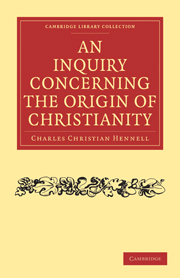Book contents
- Frontmatter
- PREFACE
- Contents
- ERRATA
- CHAPTER I Historical sketch, from the Babylonish captivity to the death of Jesus
- CHAPTER II Historical sketch, continued to the end of the first century
- CHAPTER III On the date and credibility of the Gospel of Matthew
- CHAPTER IV On the date and credibility of the Gospel of Mark
- CHAPTER V On the date and credibility of the Gospel of Luke
- CHAPTER VI On the date and credibility of the Gospel of John
- CHAPTER VII Examination of the accounts of the Resurrection and Ascension
- CHAPTER VIII Remarks on the other miracles in the four Gospels
- CHAPTER IX General objections to the miracles of Jesus
- CHAPTER X Remarks on the miracles in the Acts of the Apostles
- CHAPTER XI On the evidence afforded to the miracles by the apostolic writings
- CHAPTER XII On the prophecies
- CHAPTER XIII On the parts of Isaiah supposed to relate to Christ
- CHAPTER XIV On the book of Daniel
- CHAPTER XV Whether Jesus foretold his own death and resurrection
- CHAPTER XVI On the character, views, and doctrine of Jesus
- CHAPTER XVII Comparison of the precepts of Jesus with the Jewish writings
- CHAPTER XVIII Concluding reflections
- APPENDIX
- Frontmatter
- PREFACE
- Contents
- ERRATA
- CHAPTER I Historical sketch, from the Babylonish captivity to the death of Jesus
- CHAPTER II Historical sketch, continued to the end of the first century
- CHAPTER III On the date and credibility of the Gospel of Matthew
- CHAPTER IV On the date and credibility of the Gospel of Mark
- CHAPTER V On the date and credibility of the Gospel of Luke
- CHAPTER VI On the date and credibility of the Gospel of John
- CHAPTER VII Examination of the accounts of the Resurrection and Ascension
- CHAPTER VIII Remarks on the other miracles in the four Gospels
- CHAPTER IX General objections to the miracles of Jesus
- CHAPTER X Remarks on the miracles in the Acts of the Apostles
- CHAPTER XI On the evidence afforded to the miracles by the apostolic writings
- CHAPTER XII On the prophecies
- CHAPTER XIII On the parts of Isaiah supposed to relate to Christ
- CHAPTER XIV On the book of Daniel
- CHAPTER XV Whether Jesus foretold his own death and resurrection
- CHAPTER XVI On the character, views, and doctrine of Jesus
- CHAPTER XVII Comparison of the precepts of Jesus with the Jewish writings
- CHAPTER XVIII Concluding reflections
- APPENDIX
Summary
It is hardly worth while to dwell upon the passage found in Macrobius. Amongst the jests of Augustus, is the following:” When he heard that among the children within two years of age, which Herod king of the Jews commanded to be slain in Syria, his own son had been killed, he said,’ It is better to be Herod's hog than his son.’”
Macrobius wrote about A.D. 400, when the Gospel of Matthew was generally known throughout the empire; and if he did write these words, from what other source is it likely that he could have borrowed them?
But the passage bears the strongest marks of forgery. Macrobius was in all probability a Heathen; and why should he go out of his way to give such a careful confirmation to one of Matthew's most questionable passages? No Heathen or Christian writer has stated that Herod killed a son under two years of age. Alexander, Aristobulus, and Antipater, whom he caused to be put to death, were all young men. The saying of Augustus would therefore be equally witty, and more true, without any allusion to the infants of Bethlehem.
As the transcribers of the empire became Christian, we can imagine the temptation they must have felt to render such an easy but essential service to their new faith, as the manufacturing of Heathen and Jewish testimonies. Macrobius was likely to receive the same treatment as Josephus.
- Type
- Chapter
- Information
- An Inquiry Concerning the Origin of Christianity , pp. 372 - 379Publisher: Cambridge University PressPrint publication year: 2010First published in: 1838



